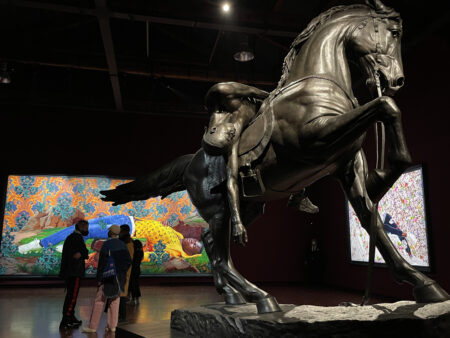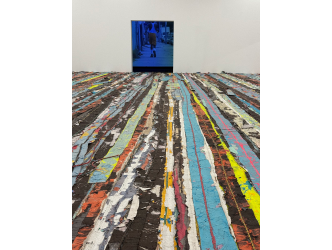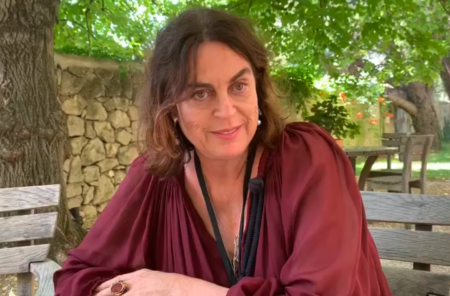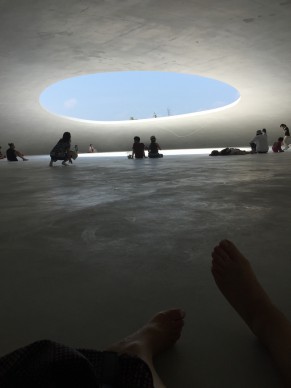Errors of judgment
Writing about contemporary art also involves making errors of judgment on art that is currently being made. The creative output of the major protagonists is still in gestation and the viewer’s framework for understanding it is constantly adapting to new reference points. It is only the art dealers who are in a permanent state of certainty because their business depends on it.
Kehinde Wiley
So I must admit that I completely underestimated the work of Kehinde Wiley (born in 1977), which I found kitsch at first glance. The artist is famous for his hyperrealist portraits in bright and contrasting colours featuring black figures. In confining myself to the aesthetic criteria of his work I overlooked one of its crucial aspects: its social role.
Ignored by History
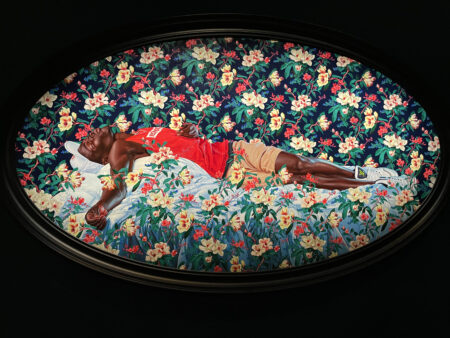
Furthermore, the subject left me in no way unmoved since I have been interested in black artists for a long time, those who have been broadly ignored by History, like the Brazilian artist Aleijadinho, (probably the first really famous black artist in the world, since 18th century) who I wrote a book on in 2017 (Les Presses du Reel) after long periods of research.
Portraits of black figures
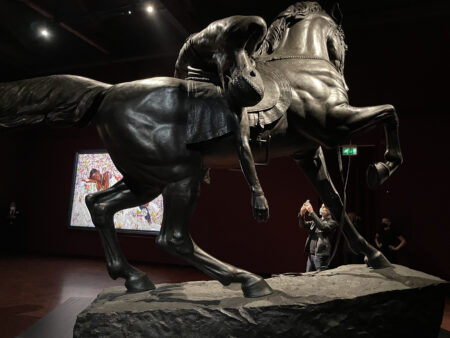
But I had underestimated another aspect of art history: the absence of portraits of black figures in Western painting and the legitimacy of making up for lost time. In this respect, long before the great wave assailing us today, Kehinde Wiley was a pioneer.
President Obama
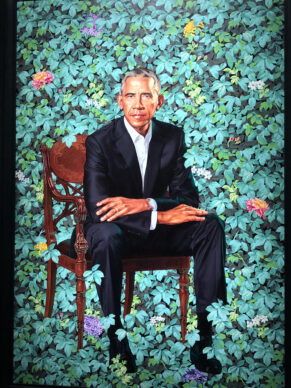
Since then he has received global recognition, among others in 2018 thanks to his portrait of President Obama which I was able to see in Washington at the National Portrait Gallery before it was taken on tour across the United States.
Fondazione Giorgio Cini
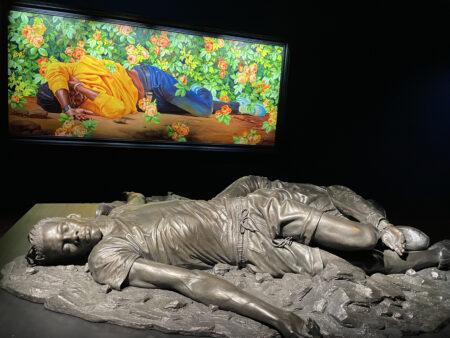
When I went to Venice on the occasion of his exhibition “An Archaeology of Silence” at the Fondazione Giorgio Cini a few weeks ago, I had the opportunity to interview the artist and I was impressed by what he said. Kehinde Wiley is clear, articulate and a true connoisseur of art history. Watch his video. It’s impressive. His speech has a great richness to it.
Exhibited at Orsay
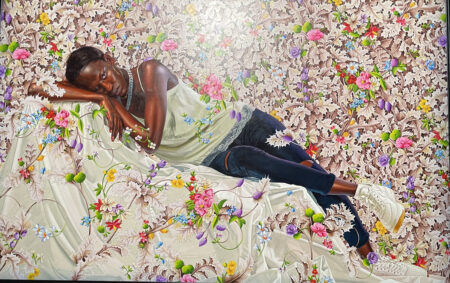
His exhibition, organized by the Templon gallery in Paris, Brussels and – from September – New York, is curated by Christophe Leribault, president of the Musée d’Orsay. It will display two of his works, a sculpture and a painting, both of them monumental in size (the bronzes go up to 5.1 metres long and the paintings 7.9 metres) – much like the ensemble presented in Venice – in the autumn in the nave of the museum dedicated to the 19th century in Paris.
The Bouguereau of Contemporary art
On the question of kitsch, Leribault counters, in reference to a “pompier” artist from the 19th century: “I also like William Bouguereau a lot and he had great success at the time. Kehinde is the Bouguereau of contemporary art.”
History painting dominates you
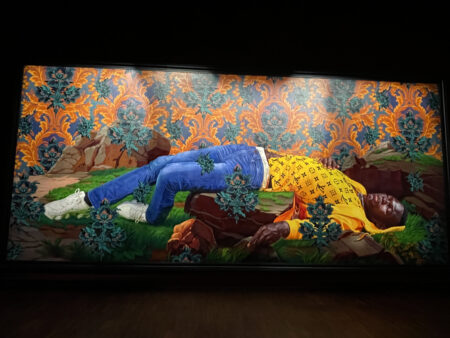
The artist himself first refers to the Louvre to explain how history painting is the agent of a kind of politics of domination. “When I go to the Louvre and I see the history paintings by David, for example, they are conceived to be shown on a large scale because they are there to express an idea of domination. They dominate you physically when you enter the room. What I want to make are artworks that do not just resemble military portraits but which resemble their core. The true core of the military portraits are the equestrian portraits.
Totemic masculine monuments

In big cities we find in the middle of squares these ridiculous, almost totemic masculine monuments. I started out in the streets of Richmond in Virginia. The horse that you see comes from a history that validates slavery in the United States. I took the generals off their horses, and I replaced them with young black and brown people. They represent a new way of dealing with this terrible past.
Using the language of oppression
I am using this language of oppression which was itself used throughout the colonized world. My work plays with the revolution while flirting with the weapons of traditional power. Wanting to be seen as beautiful, radiant, sexy is the very nature of the portrait. I simply deal with the past that we have inherited.
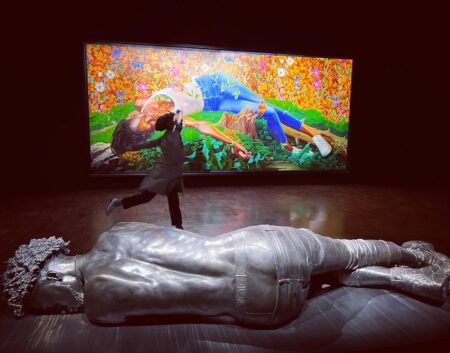
Popular culture
We are living in a media culture in which Instagram, TikTok, YouTube create a constant variety of images designed to be sexy. I want my works to be immediately perceived as integrated into popular culture, but they are also rooted in art history. I want to create works that communicate my anxiety about my identity.”
Holbein’ s Dead Christ
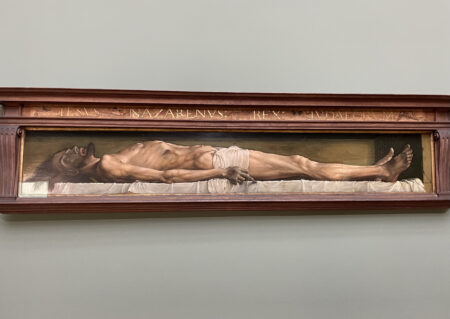
Hans Holbein
In the Venetian exhibition the fallen heroes are young people who are very anchored in the 21st century. Recorded in the Down series, they are primarily inspired by Holbein’s Dead Christ in the Tomb and recount in a stylized way, among other things, police violence against black people in the United States.
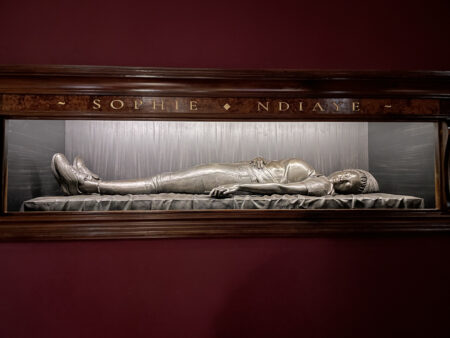
Kehinde Wiley
Reiffers Art Initiative
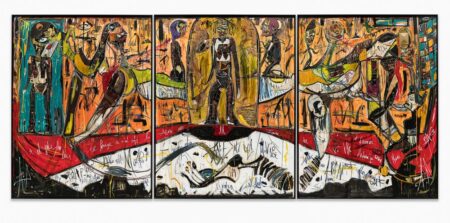
Alexandre Diop
In Paris, Reiffers Art initiatives (1), the artistic foundation promoting young contemporary creation and cultural diversity with a philanthropic purpose, founded by Paul Emmanuel Reiffers, asked Kehinde to mentor a young artist in 2022. He is Alexandre Diop (born in 1995), a French-Senegalese painter who lives in Vienna and who will be the subject of an exhibition starting on 19 October 2022. His work will also be exhibited in December 2022 at the Rubell Museum in Miami. He talks to us about his personal view of Kehinde.
Support independent news on art.
Your contribution : Make a monthly commitment to support JB Reports or a one off contribution as and when you feel like it. Choose the option that suits you best.
Need to cancel a recurring donation? Please go here.
The donation is considered to be a subscription for a fee set by the donor and for a duration also set by the donor.

